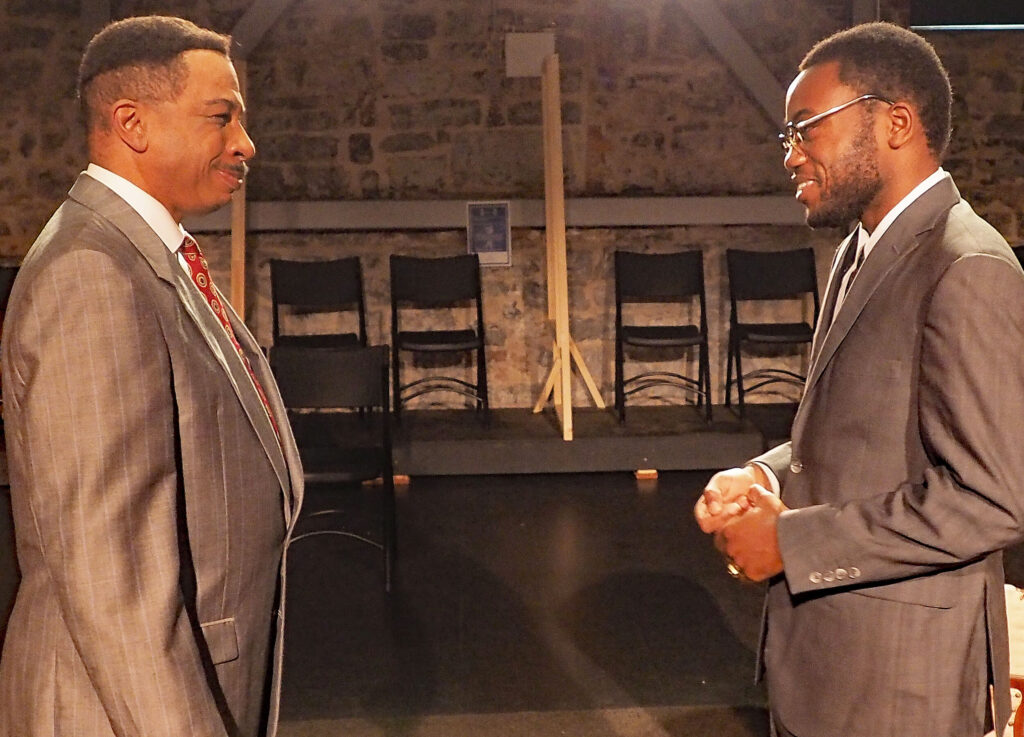MLK and Malcolm X unite in Theatre Kingston’s The Meeting
Set in 1965, the production could not feel more relevant in today’s political climate.

In the midst of the chaos that is 2020, The Meeting serves as a perfect antidote. The play, written by Jeff Stetson, and originally performed in 1987, could not have felt more timely and appropriate in the wake of BLM and rising racial tensions in the world. In essence, the play is a piece of revisionist history; imaging a fictional meeting between Martin Luther King Jr and Malcolm X.
Taking place in 1965, in the heart of the Civil Rights Movement, the play consistently dabbles with themes around leadership, and what creates an effective leader. It felt almost comical, watching two historical figures of opposing beliefs, peacefully debate their differing leadership styles when America’s own leaders on both sides struggle to have such conversations between the parties.
Set in Harlem, where the play originally premiered, we encounter the two icons at the Theresa Hotel. The play depicts a consistent theme throughout: stronger together. As Rosemary Doyle, Artistic Director of Theatre Kingston notes in the program, the play “tackles important subject matter at the right time”. The political context of polarization and division serves as the perfect context for a play preaching unity and harmony.
Not only is The Meeting a perfect antidote through its ethos of unity, but the mere presence of the production was more needed than ever in the midst of the Black Lives Matter movement. While the play itself focuses more on leadership within the Black community, many discussions throughout carry a certain relevance in 2020. For example, when MLK references the 16th Street Baptist Church bombing of four young Black Americans in the play, the reality of Black Americans (and Canadians !) being innocently killed still is a reality that exists today and evoked a strong emotional response from the audience.

The production was directed on a traverse stage, meaning the stage sat in the centre of the room, with audiences on both sides of the stage, facing each other. The layout was effective in creating a sense of intimacy, feeling like the audience themselves were inside the meeting.
For myself, and likely many others, the play was also the first live-theatre since the pandemic began. A wood panel barrier existed between each audience party. If a party of four bought tickets together, then those four could sit together. In contrast, if an individual bought tickets for themselves, they would sit in their own barrier. This set-up felt incredibly safe, and served as a great approach for future theatre productions during COVID-19. As well, the audience was at a highly reduced capacity, making The Meeting feel as intimate as possible.
The play is almost exclusively a Two-Hander, with Paul Smith as Malcolm X and Cassel Miles as Martin Luther King Jr. While Paul Smith played X with a quiet intensity, I felt that his energy, especially playing a leader known for an affinity for violence, could have been elevated. In contrast, Cassel Miles absolutely commanded the room as Martin Luther King Jr, mirroring the magnetism and presence that the Civil Rights icon was always known for.
The revisionist aspect of the play was quite intriguing, as it re-situated X’s role in the Civil Right movement. Often, King’s work overpowers Malcolm in the legacy of the movement. Essentially, not only did the play depict the differing approaches between the two icons, it showed perhaps an ambiguity as to what exactly both individuals were fighting for.
One aspect of the production that was striking was Theatre Kingston’s approach to a land acknowledgement. In lieu of the generic acknowledgement that can almost seem robotic, the programme discusses Manhattan, where The Meeting is set within Harlem, and its own relationship to colonialism. It should be noted that the acknowledgement does reference the Indigenous history in Kingston, as well as Manhattan. It mentions how the Dutch invited themselves onto land previously inhabited by Indigenous peoples. Many of these original inhabitants then moved to Harlem, where, while they have achieved success on a multitude of levels, living in a country that was disrupted by European invasion often creates an environment that does not feel like their country. This approach not only provided a refreshing contrast, but the way in which they were able to tie in a land acknowledgment while subverting our expectations by relating it to the production itself was quite brilliant.
If you have the opportunity, The Meeting is a production not to be missed. Creating both a sense of escapism and realism, the production allows audiences to ponder ideas surrounding leadership, social progress, and racial relations; all of which could not be more prevalent in 2020. So, buy yourself a ticket and consider what will happen when two of history’s finest meet in this mesmerizing historical drama.
Running Time: 60 minutes, without intermission.
Ticket Information: https://www.theatrekingston.com/the-meeting.html
